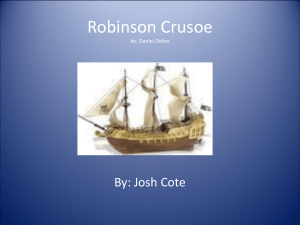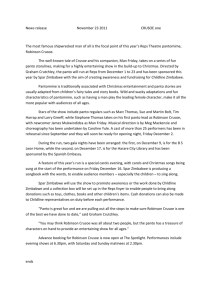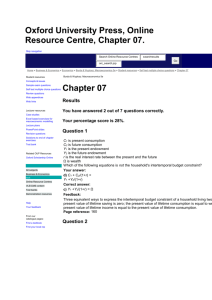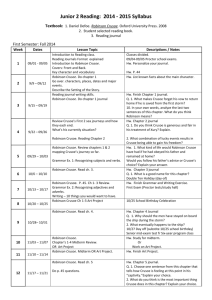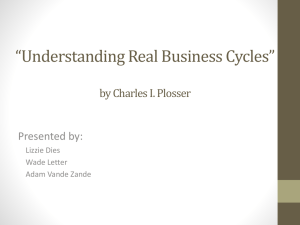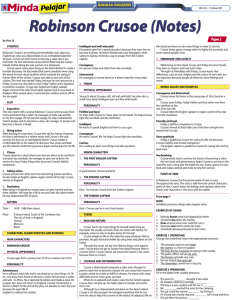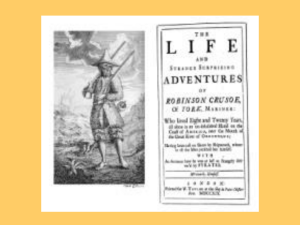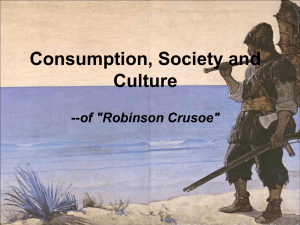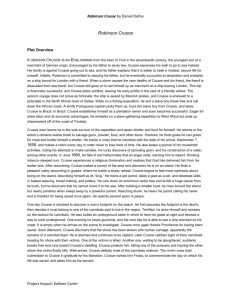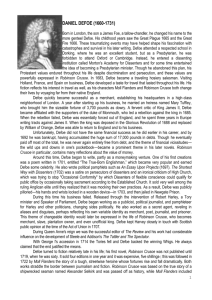This Document
advertisement
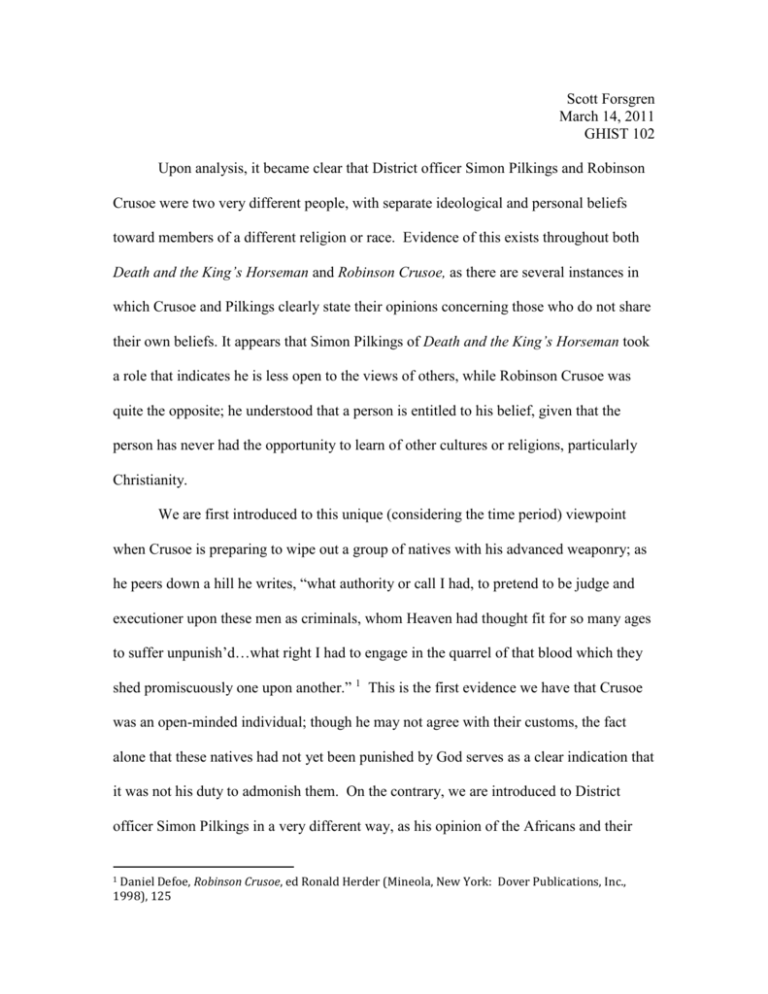
Scott Forsgren March 14, 2011 GHIST 102 Upon analysis, it became clear that District officer Simon Pilkings and Robinson Crusoe were two very different people, with separate ideological and personal beliefs toward members of a different religion or race. Evidence of this exists throughout both Death and the King’s Horseman and Robinson Crusoe, as there are several instances in which Crusoe and Pilkings clearly state their opinions concerning those who do not share their own beliefs. It appears that Simon Pilkings of Death and the King’s Horseman took a role that indicates he is less open to the views of others, while Robinson Crusoe was quite the opposite; he understood that a person is entitled to his belief, given that the person has never had the opportunity to learn of other cultures or religions, particularly Christianity. We are first introduced to this unique (considering the time period) viewpoint when Crusoe is preparing to wipe out a group of natives with his advanced weaponry; as he peers down a hill he writes, “what authority or call I had, to pretend to be judge and executioner upon these men as criminals, whom Heaven had thought fit for so many ages to suffer unpunish’d…what right I had to engage in the quarrel of that blood which they shed promiscuously one upon another.” 1 This is the first evidence we have that Crusoe was an open-minded individual; though he may not agree with their customs, the fact alone that these natives had not yet been punished by God serves as a clear indication that it was not his duty to admonish them. On the contrary, we are introduced to District officer Simon Pilkings in a very different way, as his opinion of the Africans and their Daniel Defoe, Robinson Crusoe, ed Ronald Herder (Mineola, New York: Dover Publications, Inc., 1998), 125 1 culture is evident in his very first meeting with Amusa, his constable. While Pilkings is wearing an African dress for an upcoming costume party, Amusa is in shock at his superior’s disrespect over using the religious dress in such a light. Pilkings remarks that Amusa’s disbelief toward his dress is “nonsense”, adding that he is thankful Amusa “doesn’t believe in any mumbo-jumbo.”2 Amusa refuses to speak to his superior, and is clearly taken aback by Simon Pilkings’ disrespect toward the African culture, despite the fact that Amusa had been trained by the British and converted to a Muslim. His shock over Pilkings’ dress shows just how powerful the native culture in that area was; even though Amusa was practicing a different faith, he still held a great respect for his ancestors and the region’s beliefs. In Robinson Crusoe, we are introduced to a character much in the same position as Amusa, working for a European man in his native home. Although he had previously left the natives alone, Crusoe discovered a group preparing to murder and eat several prisoners. Using the opportunity to free one and use him as a servant, Crusoe fired shots upon the ceremony and followed the escaping prisoner into the woods.3 The former prisoner saw Crusoe’s gun as a sign of power and swore his allegiance to him by kissing his feet. Though one could argue that Crusoe was only taking this young man to be used as a servant, there is no denying that his affection for the native grew every day. Even before he could speak, Crusoe saw that he was in great need of drink, and upon arriving to his campsite, “gave him bread…and a draught of water, which I found he was indeed in great distress for,” Crusoe even motioned for the young man, eventually given the name Friday, to sleep in his own bed, “so the poor 2 Wole Soyinka, Death and the King’s Horseman, ed. Simon Gikandi (New York: W. W. Norton & Company, 2003), 19. 3 Defoe, 148 creature laid down, and went to sleep.”4 This is clear evidence that Crusoe was kind and hospitable, as his effort to make his new companion feel comfortable was very different from the way Simon Pilkings treated Amusa and particularly, Elesin. When Pilkings was forced to capture Elesin to prevent his own ritual suicide, he refused to acknowledge the ceremony as an accepted and necessary part of African culture, despite Elesin’s own pleas.5 In contrast of Crusoe giving Friday his own bed to sleep on, Pilkings ordered his aide to fetch him the keys to a storage unit, which was previously used to hold slaves, “I’ll take the prisoner down myself. Two policemen will stay with him throughout the night. Inside the cell.”6 Pilkings referring to Elesin as a “prisoner” further demonstrates his disrespect toward African culture. Although one could argue that he was only following orders, Pilkings’ refusal to accept this ceremony as anything less than barbaric was obvious, both in his conversation with his officers and Elesin himself. Another difference between Crusoe and Simon Pilkings was that, while Crusoe demonstrated an ability to sympathize with a native, at no point does Pilkings consider himself to be in the wrong. A several week period comes to pass in which Crusoe is suspect of Friday’s plans, thinking that he may one day desert his obligations and leave Crusoe to return to his home. These thoughts eventually pass and Crusoe writes that he “wrong’d the poor honest creature very much, for which I was very sorry for afterwards…I was…not so familiar and kind with him…in which I was certainly in the wrong too,” even going on to call Friday his “friend”. 7 District officer Simon Pilkings 4 Defoe, 150 Soyinka, 50 6 Soyinka, 48 7 Defoe, 164 5 does not once come close to referring to Amusa or any other African as a “friend”, and his distaste for the culture continues to be apparent in the last remaining pages. When Elesin is pleading with Pilkings to allow him out of the cell to perform his duty, Pilkings is adamant that it will not occur, despite the fact that Iyaloja, another village elder, had explained the importance of the ritual, “You’ll do what you need to do form inside there or not at all, I’ve gone as far as I intend to with this business.”8 Of course, this backfires on Pilkings, as Elesin eventually commits suicide by strangling himself with the chains on his hands, upon hearing of the death of his son, Olunde. 9 The complexity of each of these characters is present throughout each text, as they both have strong ideologies that influence their opinion of others. The difference between them, however, becomes so abundantly clear when Crusoe meets, and eventually befriends, his companion Friday. This type of behavior would be unacceptable to Simon Pilkings, who believes in playing everything by the book, refusing to acknowledge the presence of a distinct culture other than his own, despite being in the minority on another nation. His refusal to accept Elesin backfired on him, as the death of Olunde sent Elesin off the edge, forcing Pilkings to deal with two dead Africans rather than only one. Had Crusoe been in the very same position, it could be better believed that he would not have refused to listen to his “prisoner”, and instead would have treated the man with greater respect. Each has a different way of achieving his goal, but it is evident that Robinson Crusoe, despite existing in the mid-1700’s, had a more open-minded lifestyle. 8 9 Soyinka, 60 Soyinka, 62
